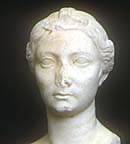 by Mary McHUGH
by Mary McHUGH
"Whether or not she actually possessed the positive qualities for which she is credited in Julio-Claudian art and propaganda, in the Roman imagination the images of Livia, the wife of Augustus, stand in marked contrast to those of Cleopatra VII, the last Ptolemaic ruler of Egypt. Livia exemplifies traditional matronly virtue and marital respectability, whereas Cleopatra exemplifies the excesses of extravagance, drunkenness, and sexual impropriety. And yet, the visual language employed in the praise of Livia at Rome is nearly identical to that used by Cleopatra in her own propaganda in Egypt. This paper is a study in how the praise of Livia and the vilification of Cleopatra in Augustan propaganda emerged from the same source, conditioned by their unique socio-historical contexts."
Mary McHugh's paper in its entirety will be presented at the 2004 Joint Annual Meeting of the Archaeological Institute of America and the American Philological Association to be held Friday, January 2, 2004 - Monday, January 5, 2004 at the San Francisco Hilton.
No comments:
Post a Comment